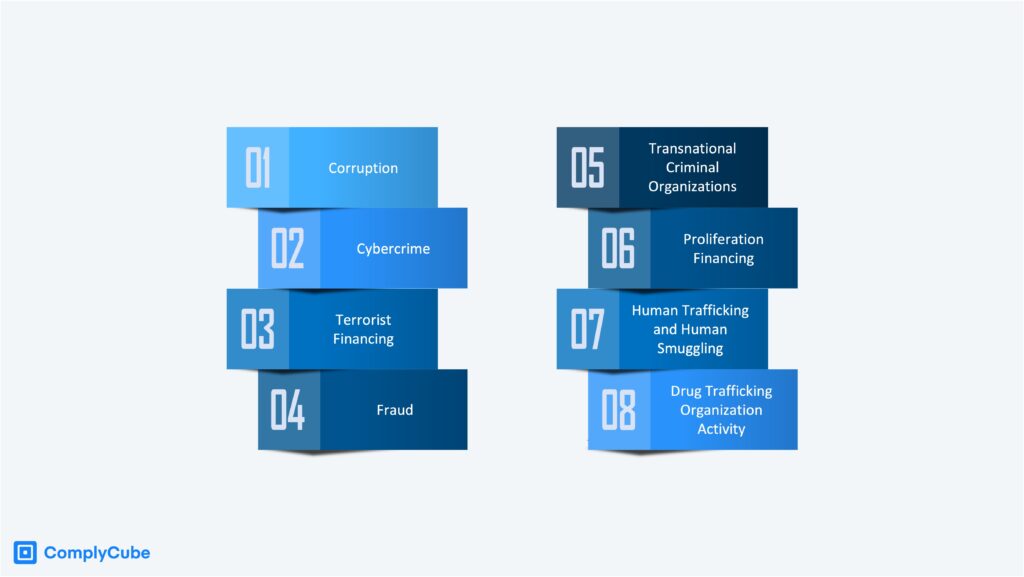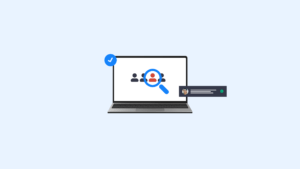The US Department of the Treasury’s Office of Financial Crimes Enforcement Network (FinCEN) has issued for the first time a list of priorities for Anti-Money Laundering and Countering the Financing of Terrorism (AML/CFT Priorities).
FinCEN issued these guidelines on 30th June 2021 under the Bank Secrecy Act (BSA) Section 5318(h)(4)(A) in order to address several new and long-standing threats facing the US national security and financial system. These threats include attempts to exploit or circumvent the US financial system’s legal, regulatory, supervisory, or enforcement vulnerabilities.
These guidelines aim to help the BSA-covered financial institutions (FIs) in their efforts to comply with the set AML/CFT policies. Although these Priorities may not apply to all organizations, institutions must comply with those related to their operations.

The 8 Priorities addressed in this list include:
1. Corruption
Bribery and misappropriation of public funds, among other forms of corruption, threaten the US national security and financial system. Typically, such actions degrade the rule of law, deprive innocent citizens of their fundamental human rights, and undermine democratic institutions.
In fact, according to the National Security Study Memorandum issued by President J. Biden on 3rd June 2021, corruption causes laundering of approximately 2- 5% of the world’s GDP.
FinCEN issued advisories on human rights abuses facilitated by corrupt foreign political figures and their financial promoters concerning South Sudan, Venezuela, and Nicaragua to combat corruption.
FinCEN requires all covered financial institutions to consult advisories regarding corrupt foreign entities and human rights abuse.
The guidelines also require these financial institutions to reconsider their particular AML/CFT policies and increase the robustness of programs related to high-profile foreign political figures.
2. Cybercrime
FinCEN describes cybercrime as illegal activities involving computers, computer networks, or other digital devices.
The cybercrimes covered here include network attacks, phishing, and other cybercrimes targeting organizations’ Software as a service (SaaS) and Application Programming Interface (API) software.
These crimes target the confidential information of specific institutions, threatening the national security and financial system. For this reason, FinCEN has issued advisories warning addressed institutions of the predominant cybercrime frauds, which include illegal use of convertible virtual currencies (CVCs), ransomware attacks, and FinCrime, to mention a few.
FinCEN also urges institutions to be vigilant in sharing information on suspected cybercrime activities.
3. Terrorist Financing
Both domestic and foreign terrorism is a threat the US national security.
Terrorist groups require funding to recruit members, support training and other logistics and execute their operations, thus creating a chain of illegal terror funding activities. Preventing such funding is crucial in helping the US government in its fight against terrorism.
For this reason, FinCEN requires covered institutions to identify and file Suspicious Activity Reports (SARs) on potential terror funding. Furthermore, this government bureau urges the involved institutions to comply with the set sanction programs regarding the AML/CFT risk-based policies.
4. Fraud
Organizations such as consumer banks, healthcare, and tax institutions generate the highest percentage of illicit funds through fraud. For instance, the US healthcare organization is estimated to generate at least $100 billion annual illegal funds.
The most common fraud activities include corruption, drug smuggling, human trafficking, and organized crime, to mention a few.
Fraudsters launder their proceeds through methods such as transfers through accounts of established offshore legal entities, money mules, or accounts controlled by cyber actors, etc.
Therefore, FinCEN has categorized fraud under its list of Priorities and advises the involved organizations. These advisories emphasize email account compromise and Business Email Compromise (BEC).
5. Transnational Criminal Organization Activity
Transnational Criminal Organizations (TCOs) are included in the Priorities list because they are involved with several criminal activities that threaten the US national security and financial systems.
The common TCOs activities include human trafficking and smuggling, drug trafficking, wildlife trafficking, and weapons trafficking.
FinCEN urges the covered financial institutions to be vigilant in identifying and reporting such criminal activities. In addition, the Priorities guidelines require involved institutions to re-evaluate the robustness of the AML/CFT policies regarding these illegal activities.
Also, financial institutions must monitor suspicious activities, trace the transactions, and comprehensively clarify Suspicious Activity Reports (SARs) filings.
6. Proliferation Financing
Proliferation financing comprises activities that exploit the United States’ financial infrastructure in an attempt to exchange illicit funds. These funds might, in turn, be used for violent actions such as purchasing mass destruction weapons or developing Artificial Intelligence/ Machine Learning (AI/ML) tools for evasion of US or UN sanctions.
For this reason, FinCEN requires the covered institutions to review the sanction programs, especially those involved with trade and economy. Moreover, reviewing these programs is essential in identifying and reporting suspicious criminal activities.
Most importantly, financial institutions, especially those that facilitate international transactions, must perform Customer Due Diligence (CDD) and Know Your Customer (KYC) protocols to identify criminals who seek to engage in proliferation financing.
7. Human Trafficking and Human Smuggling
Financial proceeds from human traffickers and smugglers can intersect with the US formal financial system at any point during the execution of these illegal activities.
The human trafficking and smuggling networks use various mechanisms to move their illicit proceeds, such as the standard cash smuggling by individuals, to more sophisticated channels, such as professional money laundering networks.
These proceeds may be from income associated with logistics and gains from exploiting victims.
FinCEN has issued advisories to help covered organizations identify behavioral and financial red flags associated with human smuggling and trafficking activities.
8. Drug Trafficking Organization Activity
Drug trafficking continues to generate enormous proceeds for Drug Trafficking Organizations (DTOs). Trafficked drugs and the proceeds laundered through trafficking often trigger public health emergencies in the US.
These drugs are brought to the US from countries such as Mexico, China, and Columbia. Here, DTOs use professional money laundering networks to exchange their cash proceeds or pose as money brokers in several trade-based money laundering (TBML) schemes.
In line with this, FinCEN urges the concerned institutions to refer to the existing FinCEN advisory regarding the trafficking of synthetic opioids such as fentanyl and red flags to detect such illicit transactions.
Conclusion
Lately, criminal activities such as corruption, fraud, drug trafficking, and terrorism, to mention a few, have become rampant in the US. Such illicit activities undermine the US financial system and national security.
And for this reason, FinCEN has issued guidelines known as The Priorities to reduce the threats these illegal activities pose to the US financial system.
All eyes are now on the covered financial institutions to see how well they comply with the set guidelines in the fight against money laundering and financing terrorism.
Need more information on FinCen priorities or AML/CFT procedures? Speak with an expert.



